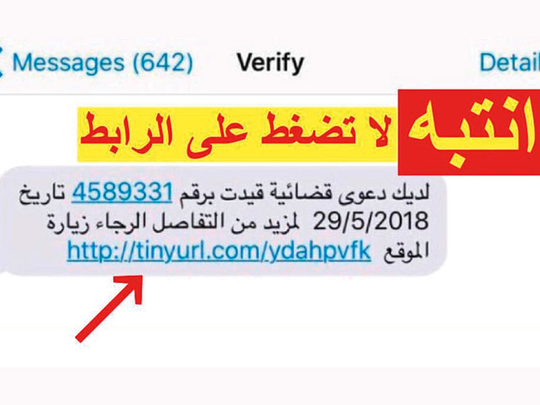
Dubai: Residents in the UAE are being warned against falling prey to the latest SMS scam notifying them of a court case registered against them.
The Telecommunications and Regulatory Authority (TRA) issued the warning after the scam recently went viral, leaving many people in a state of panic.
The SMS comes with a fake link in which the worried user would rush to click in order to view the court case filed against them.
The TRA said residents should watch out for these messages, which belong to unknown sources, and avoid clicking the link that come along with them, as their personal information can be exposed and they can be vulnerable to cyberattacks.
In a statement to Gulf News, the TRA said the new scam is a SMS-ishing technique, short for “SMS Phishing”.
“In this case, the attacker or the hacker persuades the receiver of this SMS to click on the link provided which might contain a harmful data such as a Trojan, a malware or a virus, or asks them to provide personal information such as credit card information or bank account information.”
Apart from avoiding clicking on the link provided by the attacker, the authority advised that residents must not reply or engage with the sender.
“Think before you act, be aware of communications that implore you to act immediately and verify the sender before engaging the provided information such as the link or attachment as they might do more harm than good,” The TRA statement added.
The Computer Emergency Response Team (aeCERT) of the TRA confirmed a 42 per cent drop in the number of cyberattacks in the UAE in the first five months, from 341 attacks in 2017 to 199 attacks in 2018.
Scammers usually entice victims with words and phrases that are designed to grab their attention and possibly scare them. Capital letters screaming out “URGENT ACTION NOW” or “CONTACT IMMEDIATELY” tends to worry people a bit and leads to panic, which could then lead to irrational decisions.
Sometimes the links scammers encourage users to click on look rather similar to well-known brands and companies, such as telecom and service providers, or even banks. Every hyperlink and URL is unique, while these links look identical at first glance, there is something different about them.
The TRA said it is currently hosting multiple security awareness episodes in their social media account @theuaetra for the public to join and raise issues such as social engineering or SMS phishing attacks that might affect the public as well.
“We are welcoming any questions from the public and are ready to respond to any incident that might occur to ensure their security and guide them through solving it properly,” they said.







